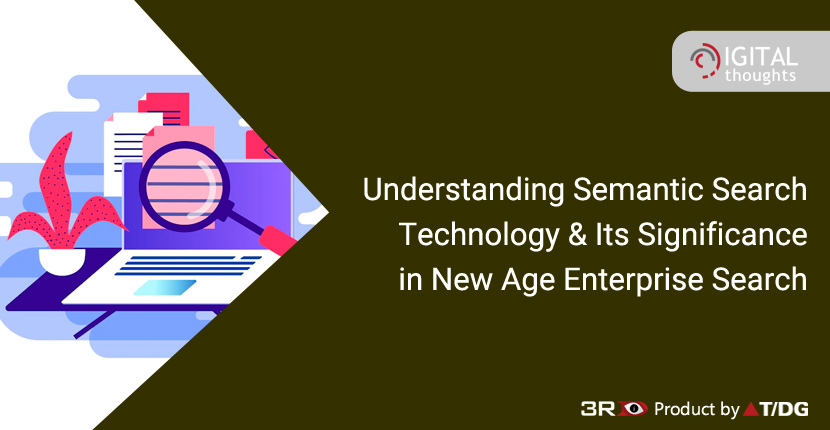Semantic Search: Understanding the Technology and Its Significance in New Age Enterprise Search

In today's highly competitive world, businesses can't afford to miss out on using data to develop critical insights that drive corporate success. A semantic search software is what organisations need today in this situation, and investing in an enterprise search engine with semantic capabilities is a smart choice.
What is Semantic Search
Semantics is a branch of linguistics that investigates the meanings, synonyms as well as the meanings under different contexts. The study of terms and their meaning is what semantic search is all about. In order to improve search accuracy, semantic search software attempts to interpret a searcher's purpose through contextual interpretation.
Semantic search software involves going beyond the dictionary definition of a query to comprehend the searcher's purpose in a specific situation. Through the learning from previous relevant results and creating associations between things, a semantic search tool can use the contextual meaning of the terms as they occur in the searchable database to provide more relevant results.

How Semantic Search Differs from Keyword Search
Semantic means 'meaningful,' and semantic search involves retrieving results that are meaningfully related to the user's query. To put it differently, a semantic search software is more concerned with the query's context than about the words and phrases that traditional keyword-based search focuses on.
When compared to the more usual keyword-based search strategy, which depends on matching keywords in the user's query to search results to obtain relevant results, semantic search takes a completely different approach. The semantic search software brings about search relevancy that is impossible to achieve with a keyword-based approach. A semantic search software is designed to recognise the user's intent behind the query, and it is through this principle that semantic search tools are able to produce far more relevant search results.
Semantic Search with 3RDi Search
A semantic search software combines information from a variety of sources and analyses it to extract essential insights. 3RDi Search is a semantic search software that allows you to effortlessly integrate all of your enterprise data, utilize the power of semantic enrichment, and transform content into knowledge, taking your Search and Analytics solutions to the next level.
3RDi Search's semantic platform enables quick data utilisation and monetization within data-driven organisations, and it's backed up by managed data and application development and support services, which provide end-to-end data and solution lifecycle management.
How Semantic Search with 3RDi Works
Within 3RDi semantic search software, semantic analysis is divided into multiple steps. The system uses fast and superior algorithms at each stage, resulting in thorough enrichment and faster content integration.
1] Tokenization: Splitting text into individual sentences and words.
2] Morphological analysis, stemming: Recognizing when two different word forms come from the same root word.
3] Grammatical analysis, parts-of-speech tagging: Labeling when a word is used as a noun, verb, adjective and adverb, etc.
4] Word sense disambiguation: Refers to identifying the context of a word in the query. For example is "crane" in a given text a type of bird or a type of machine.
5] Vocabulary, ontology mapping: Exploring to find synonyms or words similar in meaning to the word in the query. For example, does "crane" have synonyms or does "crane" belong to a class of "construction automobile".
6] Linked Open Data: Refers to mapping to other relevant sources of information to help the user learn more. For example, linking to Wikipedia, DBpedia for useful information about, say, manufacturers of "crane".
Gaining an Edge with Semantic AI
Semantic AI is simply a semantic search tool powered by AI, and it comes with a slew of benefits that can be applied across the whole data lifecycle. The advantages of Semantic AI are as follows:
- When AI meets semantic search, the resulting data or insights will be of the maximum relevancy and accuracy, which can be valuable in a variety of projects and in business decision-making.
- Semantic AI is a hybrid of symbolic and statistical AI technologies that allows easy selection from a choice of techniques to accomplish a goal.
- Semantic AI has the ability to change this since it can combine insights from unstructured data with those from structured data, allowing for better decision-making.
- Semantic artificial intelligence (AI) is a sort of AI that has the ability to contribute with the creation of self-optimizing gadgets. A machine that optimises itself is known as a self-optimizing machine.
Wondering how you can leverage the power of an advanced semantic search software? You need a powerful platform like 3RDi Search that is powered by semantics technology and AI. Visit www.3rdisearch.com/ or drop us an email at info@3rdisearch.com and our team will get in touch with you to help you get started on your journey of adding more value and meaning to the experience of the user with every interaction with the search engine.
